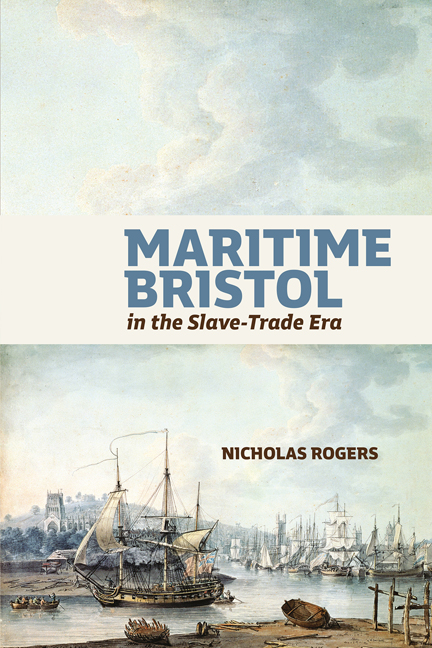Book contents
- Frontmatter
- Dedication
- Contents
- List of Figures
- Acknowledgments
- List of Abbreviations
- Introduction: High Tides, Atlantic Waters
- 1 The Pilots of Pill
- 2 The Hazards of the Bristol Slave Trade
- 3 Slave-ship Sociology
- 4 The Unfortunate Shipwright, or, the Trials of Robert Barker
- 5 Mutiny and Murder on Bristol’s Long-haul Ships, 1720–70
- 6 Bristol Privateering in the Mid-eighteenth Century
- 7 The Impressment of James Caton, 1779
- 8 New York in Bristol: the Crugers
- 9 The Politics of Abolition in Late Eighteenth-century Bristol
- Bibliography
- Index
9 - The Politics of Abolition in Late Eighteenth-century Bristol
Published online by Cambridge University Press: 08 May 2024
- Frontmatter
- Dedication
- Contents
- List of Figures
- Acknowledgments
- List of Abbreviations
- Introduction: High Tides, Atlantic Waters
- 1 The Pilots of Pill
- 2 The Hazards of the Bristol Slave Trade
- 3 Slave-ship Sociology
- 4 The Unfortunate Shipwright, or, the Trials of Robert Barker
- 5 Mutiny and Murder on Bristol’s Long-haul Ships, 1720–70
- 6 Bristol Privateering in the Mid-eighteenth Century
- 7 The Impressment of James Caton, 1779
- 8 New York in Bristol: the Crugers
- 9 The Politics of Abolition in Late Eighteenth-century Bristol
- Bibliography
- Index
Summary
The progress of abolition in Bristol presents us with an interesting paradox. Why did the emergence of a movement to abolish the slave trade falter after a promising start in the 1780s? The obvious answer is that Bristol was a slave port and successfully muffled and contained demands for the termination of the trade. While this is undoubtedly true, it is not an entirely sufficient answer. Bristol had many of the qualities that made it a vibrant scene of public debate: a rich assortment of clubs and associations; a newspaper press with at least three weeklies vying for public attention; and a library society and circulating libraries that meant the city had antislavery literature at its fingertips. Following up on James Bradley's research into the dissenting vote and British radicalism, David Richardson, the foremost authority on Bristol's slave trade, has surmised that Bristol had all the conditions that made Manchester and Sheffield important centres of abolition sentiment. And yet Bristol did not emulate the mass petitioning of those towns in the big push for abolition in 1791–2. Along with Liverpool it was mute; encircled by a host of West Country towns that did join in the mass condemnation of the slave trade, including Bath, Trowbridge, Taunton, Gloucester, and Exeter.
In the first seven decades of the eighteenth century, abolition was a non-starter in Bristol. Until 1745, Bristol was the pre-eminent British slave port, profiting from the termination of the Royal Africa Company's monopoly in 1698. Clearing only five ships per annum in the late 1690s, Bristol was sending out over forty a year by 1720 and over forty-five in 1730–2 and 1737–8. Over the course of the long eighteenth century, 1698–1807, Bristol carried 587,000 enslaved Africans to the Americas, of which 486,000, or 82.8 per cent, survived. In its heyday, Bristol merchants were responsible for 40 per cent of all British slaving, and the knock-on effect of this activity was immense, in terms of shipbuilding, manufacture for African markets, marine insurance, and the importation, refining, and selling of tropical products. David Richardson has calculated that in 1790 perhaps 40 per cent of all economic activity in the port was involved one way or another with the slave trade, and at its prime one can reasonably assume it was higher.
- Type
- Chapter
- Information
- Maritime Bristol in the Slave-Trade Era , pp. 198 - 227Publisher: Boydell & BrewerPrint publication year: 2024

